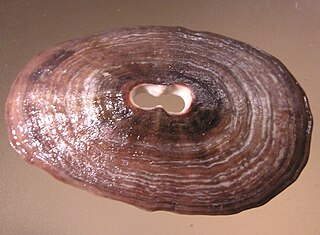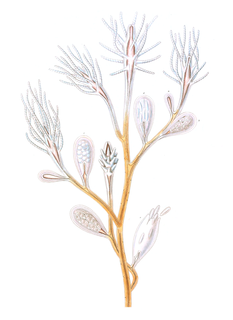
Leptothecata, or thecate hydroids, are an order of hydrozoans in the phylum Cnidaria. Their closest living relatives are the athecate hydroids which are similar enough to have always been considered closely related, and the very apomorphic Siphonophora which were placed outside the "Hydroida". Given that there are no firm rules for synonymy for high-ranked taxa, alternative names like Leptomedusa, Thecaphora or Thecata, with or without the ending emended to "-ae", are also often used for Leptothecata.

Rhopalonematidae is a family of hydrozoans. The family comprises 15 genera and 36 species.

Haleciidae is a family of hydrozoans. Their hydroid colonies emerge from a creeping hydrorhiza and usually form upright branching colonies, although some species' colonies are stolonal. Their gonophores are typically sporosacs, growing singly or bunched into a glomulus. They remain attached to the hydroids or break off to be passively drifted away; in a few, the gonophores are naked.
Pseudoliva is a genus of sea snails, marine gastropod mollusks in the family Pseudolividae. Pseudoliva is the type genus of that family.
Csiromedusa medeopolis is a species of hydrozoan described in 2010. It was discovered in the estuarine waters of the River Derwent near to the Commonwealth Scientific and Industrial Research Organisation's Marine and Atmospheric Research branch in Hobart, Tasmania, Australia. C. medeopolis has been described as presenting a new family and genus as well as species.

Bougainvillia muscus is a marine invertebrate, a species of hydroid in the suborder Anthomedusae.

Oceaniidae is one of the over 50 cnidarian families of the order Anthomedusae. It contains nearly 50 species in ten genera.

Aequoreidae is a family of hydrozoans. There are approximately 30 known species found in temperate and tropical marine coastal environments. Aequoreids include Aequorea victoria, the organism from which the green fluorescent protein gene was isolated.
Solmarisidae is a family of hydrozoans in the order Narcomedusae. The name is sometimes spelled "Solmaridae".

Bougainvillia is a genus of hydroids in the family Bougainvilliidae in the class Hydrazoa. Members of the genus are characterised by having the marginal tentacles of their medusae arranged in four bundles. Some species are solitary and others are colonial but all are filter feeders. They are found in the Southern Ocean, having a circumpolar distribution, but some species also occur in the Northern Hemisphere, possibly travelling there as polyps on the hulls of ships.

Hydractiniidae is a cnidarian family of athecate hydroids.
Bougainvillia frondosa is a marine invertebrate, a species of hydroid in the suborder Anthomedusae. It was first described by Mayer in 1900.
Bougainvillia aberrans is a marine invertebrate, a species of hydroid in the suborder Anthomedusae. It was first described by Dale Calder in 1993. They have four radical clusters of marginal tentacles. Bougainvillia aberrans is found in Bermuda in the western North Atlantic Ocean.

Eudendrium is a large genus of hydroids (Hydrozoa), one of two in the family Eudendriidae. These animals are marine cnidarias in the family Eudendriidae.

Fissurella crassa, common name the thick keyhole limpet, is a species of sea snail, a marine gastropod mollusk in the family Fissurellidae, the keyhole limpets and slit limpets.

Solanderia is the sole genus of hydrozoans in the monotypic family Solanderiidae. They are commonly known as tree hydroids or sea fan hydroids.

Filifera is a suborder of hydrozoans in the order Anthoathecata. They are found in marine, brackish and freshwater habitats.

Cordylophora is the sole genus of hydrozoans in the monotypic family Cordylophoridae.
Sertularella crassa is a branching colonial hydroid in the family Sertulariidae.
Paracoryne is a monotypic genus of cnidarians belonging to the monotypic family Paracorynidae.










